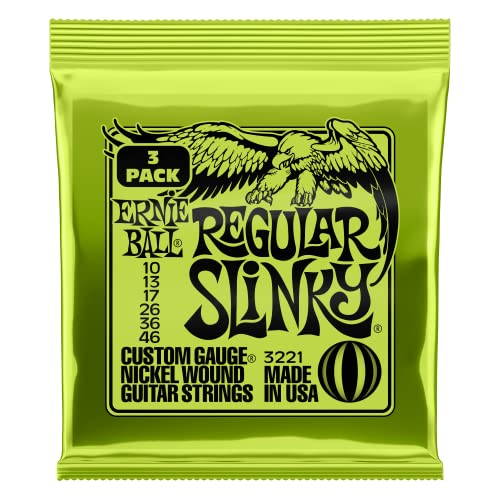It’s a fact of life for guitarists – your strings will break. Probably at the worst possible time as well! Right before a gig or just after restringing.
But why do guitar strings break? What is it that causes them to snap? And once you know what can you do to avoid it happening again (or at least slow it down).

Well there are a few reasons guitar strings break but the main ones are the age of the strings, a build up of corrosion, an aggressive playing style and too much tension. There are more but those are probably the most common.
It’s important to understand why these factors cause strings to break so you can reduce the risk as much as possible. You won’t be able to avoid your strings ever breaking but by treating them right you can definitely reduce how often it happens.
So let’s go through the main reasons that cause guitar strings to break, explain why it happens and how you can prevent it.
Why do Guitar Strings Break?
There are many factors that go into why guitar strings break.
Age
The older the guitar string is the more likely it is to break. As guitar strings age and get used they get worn down and become weaker.
You may have read stories of people saying they’ve played for years or even decades and never broken a string. Which is possible, I’m sure.
But over time strings do degrade and even if they’re not breaking they won’t sound as good. They’re not particularly expensive to replace either so there’s no reason not to.
So it’s a good idea to keep a check on your strings. How do they feel, look and sound.
When you notice them start to deteriorate then it’s time to change them for a new set.
Badly Strung Strings
I made this mistake a fair few times when I was a beginner and learning how to setup my guitar properly. If you restring it badly then there’s a good chance one or more of the strings will break a lot sooner than you’d like.
Something to look for if you are new to stringing your guitar is whether you’re bending the strings when changing them. Lots of newbies bend the string into the tuning post, which you can do, but you need to be certain you’re doing it in the right place.
You want to leave roughly 1 and a half to 2 inches of string to wind around the post. If you get it wrong then all you’re doing is creating a weak spot and making it more prone to breaking.
Too Much Tension
The other problem beginners make is tightening the string too much when restringing or tuning. I’ve done this myself a couple of times and it’s was always the high e that broke.
I remember when I was very new and trying to adjust the action on my Squier Strat. I spent ages detuning, adjusting the string height and then retuning over and over.
Eventually the high e just gave out from that constant back and forth of tension. Lesson learned though!
Bad Technique or Playing Style
The way you play is a huge cause of broken strings. Possibly the biggest. The more aggressive you play then the greater chance you have of your strings breaking.
So be honest – do you hit the strings hard? Really dig in? Plucking super aggressively?
You aren’t alone! Lots of guitarists think they need to smash the strings with the pick.
And in fairness sometimes you do. But not always. And you should be learning or making a conscious effort to pick with less force.
Not only will it improve the control of your picking but it’ll sound better, you’ll be able to introduce more dynamics into your playing and most importantly your strings will last a lot longer.
So if you’re breaking strings often and have ruled out the other causes here then it’s time to take a look at how you’re playing and how you’re attacking the strings.
Corrosion
This goes somewhat with age as the older the string the more corroded it’ll become. But some of us are naturally sweaty or have more acidic sweat than others.
That means the strings will get corroded quicker and be more prone to breaks. You can’t avoid this entirely but if you wipe down your strings after every use you’ll stop them getting corroded as quickly and make them last longer.
Sharp Edge of Nut, Saddle or Tuning Posts
Guitar strings pass over both the nut at the head and the saddle at the bridge. If either of those has a sharp edge or burr then over time that can wear down the string causing a weak spot and leading to eventually breaking.
The tuning posts can also have sharp edges or burrs that cause the same problem.
The answer? Check your saddles, nut and tuning posts for burrs and sharp edges. If you find any then either replace the culprit or file/sand them down so they’re nice and smooth.

Poor String Quality
The poorer the string the quicker it will break. If you’re buying and using no-name brand strings or getting some really cheap sets you can expect them to last a lot less than better strings.
They will be made from poorer materials and may not need to meet the same standards as the well known brands. Sometimes the phrase ‘you get what you pay for’ is wrong, but in this case it’s spot on.

Humidity and Temperature Changes
This is a real pain because it can happen without you knowing. Changes in the temperature and humidity can cause string tensions to alter and result in a broken string.
This is something to consider if you’re getting a lot of broken strings but don’t know why. If none of the other factors in this list apply and you live somewhere the temperature or humidity fluctuates regularly then it’s worth investigating.
Simply keeping your guitar in a case could be enough to solve the problem. A more extreme solution could be getting a humidifier, but that’s only if you find you definitely need it.

Sharp Frets
Not that common but worth looking out for. You will occasionally get sharp edges on your frets and much like the burrs on the bridge, nut and other parts of the guitar they will wear down and weaken your strings.
You can (gently) file down the sharp frets until they’re smooth. Try to avoid taking too much off the fret wire or it could lead to intonation problems.

A Bad String
Sometimes you just get unlucky and one of your strings is a dud. Weak for some reason, passed quality control even though it was badly made etc.
It’s annoying but you can at least console yourself knowing it wasn’t anything stupid you did!
How to Extend the Lifespan of Guitar Strings
So now we know what causes strings to break how can we avoid that and extend how long they will last.
Here are a few tips to help your strings have a long life:
- Stretch new strings out when you install and tune them. Stretching them helps the strings to stay in tune but also spreads the tension out across the entire string. This makes the tension even rather than worse in certain spots and those spots are often the weakest points and most likely to break.
- Wash your hands before you play. The oils in your hands and fingers corrode the strings. Washing them beforehand will reduce the amount of oils you pass on to the strings.
- Clean and maintain your strings regularly. That means wiping them free of sweat and dirt with a cloth after every time you have played.
- Use string cleaner or conditioner to keep them clean and lubricated. Wiping strings with a cloth is a good start but using a proper cleaner will remove more dirt and also keep the strings lubricator which will reduce friction and mean they wear out slower.
- Try coated strings instead of regular ones. Coated strings are more expensive but you’re paying for the extra protection the coating provides and the fact they should last longer. The coating should prevent rusting and corrosion. They’re not for everyone but if you really want to extend how long your strings last they’re worth trying.

How to Maintain Guitar Strings
Keeping your guitar strings in good condition also stops them from breaking as frequently.
- Keep your guitar in its case and don’t expose it to big changes in temperature and humidity. The case will protect the strings from some temperature changes and also stop the strings from picking up dust and dirt.
- If humidity and temperature changes are an issue where you live then either invest in a humidifier or store your guitar(s) in a cool and dry place.
- Guitar strings need changing regularly, especially if you’re playing a lot. Older strings will be more likely to break as well as sounding much worse. So change your strings roughly every 2 to 3 months or when you notice them looking and feeling worn.
Now you know why guitar strings break and what you can do to reduce how often it happens there’s no excuse to be breaking strings every week.